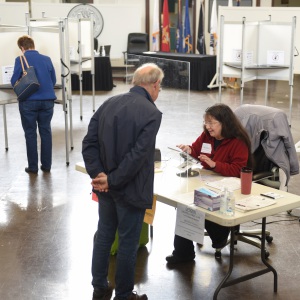Editorial: Mixed results on LGBT scorecard
| Published: 04-07-2017 7:57 PM |
The actions of our courts and government agencies reveal discrimination as a force that is sometimes subtle but nonetheless directly affects the lives of the nation’s LGBT citizens. Recent days have shown that the battle continues, with both encouraging wins and frustrating setbacks.
In Chicago, a federal appeals court ruled that companies cannot discriminate against gay or lesbian employees in the workplace because of their sexual orientation.
This decision in the Midwest makes a difference for the nation, because it contradicts a different federal court’s opinion in Georgia three weeks ago. So the issue will have to be resolved by the Supreme Court, in support of the Chicago decision, we hope.
The case stems from a lawsuit by Indiana teacher Kimberly Hively alleging that the Ivy Tech Community College in South Bend did not hire her full time because she is a lesbian.
At play is the 1964 Civil Rights Act. In the 8-to-3 decision Tuesday by the full 7th U.S. Circuit Court of Appeals in Chicago, Judge Richard Posner wrote that evolving norms call for expanding the interpretation of the Civil Rights Act — which bars discrimination based on race, color, religion, national origin or sex — to encompass lesbian, gay, bisexual and transgender people.
“I don’t see why firing a lesbian because she is in the subset of women who are lesbian should be thought any less a form of sex discrimination than firing a woman because she’s a woman,” wrote the judge, who was appointed by Republican President Ronald Reagan.
Hively said after the decision that the time has come “to stop punishing people for being gay, being lesbian, being transgender.” Score one for LGBT rights — for now.
We will have to wait to see whether the high court, with its newest conservative justice, Neil Gorsuch, agrees the landmark Civil Rights Act can be interpreted to protect LGBT workers. It makes perfect sense, but will it pass muster as the law of the land by the strict constuctionists on the court?
Article continues after...
Yesterday's Most Read Articles
 Locking up carbon for good: Easthampton inventor’s CO2 removal system turns biomass into biochar
Locking up carbon for good: Easthampton inventor’s CO2 removal system turns biomass into biochar
 Northampton man will go to trial on first-degree murder charge after plea agreement talks break down
Northampton man will go to trial on first-degree murder charge after plea agreement talks break down
 Police report details grisly crime scene in Greenfield
Police report details grisly crime scene in Greenfield
 Area property deed transfers, April 25
Area property deed transfers, April 25
 Advancing water treatment: UMass startup Elateq Inc. wins state grant to deploy new technology
Advancing water treatment: UMass startup Elateq Inc. wins state grant to deploy new technology
 Super defers Amherst middle school principal pick to successor; one finalist says decision is retaliation for lawsuit
Super defers Amherst middle school principal pick to successor; one finalist says decision is retaliation for lawsuit
Meanwhile, in Washington, the effects of government action — or, in this case, inaction — might also impact the gay community, but perhaps in a more insidious, subtle, harmful way.
Looking ahead to the 2020 census, activists had pressed for adding a tally of the number of LGBT people living in the United States, and an early draft of plans by government demographers addressed that question. But in the recently released proposal, the U.S. Census Bureau — now a part of the Trump administration — did not include plans for gathering the data.
The bureau counts Americans according to race, gender, ethnicity and other personal characteristics. Census numbers play a key role not just in providing a current picture of the ever-changing American populace, but also in vital decisions about how the federal government spends its time and money.
People who are not counted have a harder time standing up.
Gay rights advocates say the census omission is just more evidence that the Trump administration is going back on a campaign promise to protect the gay community. Last week, the Department of Health and Human Services removed questions on sexuality from two of its surveys.
In recent years, gays have come out of the closet in which society had tried to shut them. Massachusetts and other states turned the tide toward legalizing gay marriage, followed by the June 2015 U.S. Supreme Court decision making same-sex unions the law of the land.
But work remains in other areas, and members of the LGBT community deserve equal protection in the workplace — and they deserve to be counted.

 Charlene Galenski: Blake Gilmore, a strong candidate for Deerfield’s Selectboard
Charlene Galenski: Blake Gilmore, a strong candidate for Deerfield’s Selectboard Annette Pfannebecker: Vote yes for Shores Ness and for Deerfield
Annette Pfannebecker: Vote yes for Shores Ness and for Deerfield Columnist Susan Wozniak: Rising costs long ago swamped hippie ideal
Columnist Susan Wozniak: Rising costs long ago swamped hippie ideal Guest columnist Rudy Perkins: Dangerous resolution pins ‘aggression’ on Iran
Guest columnist Rudy Perkins: Dangerous resolution pins ‘aggression’ on Iran
